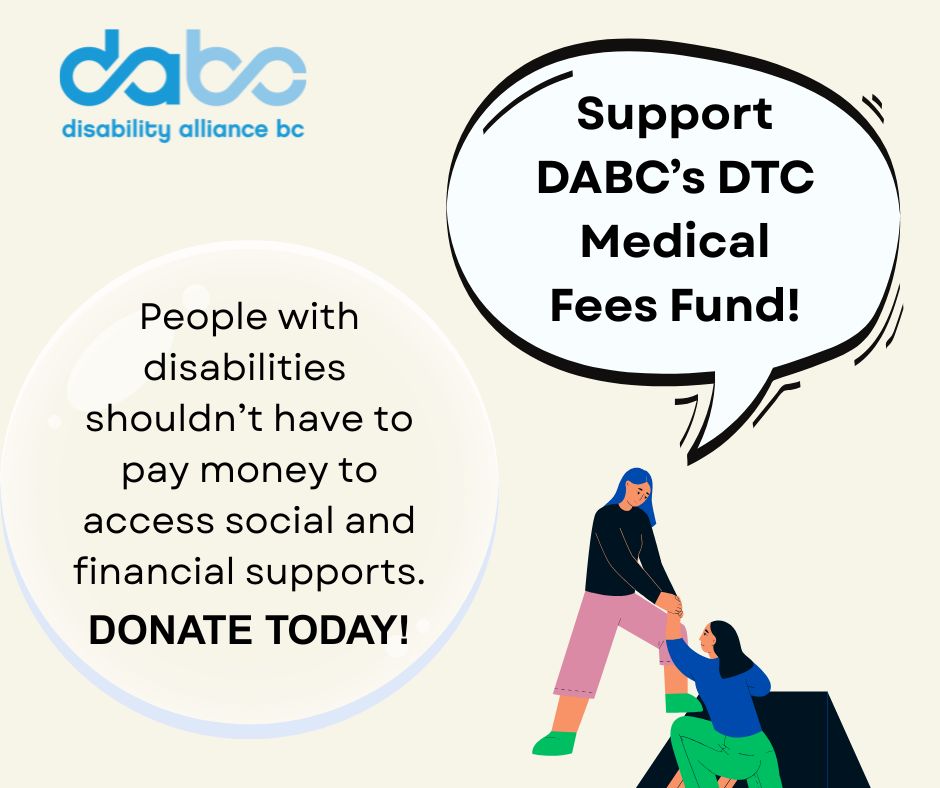1136 posts found for
Let's Rally for Accessibility Celebration & Awareness
DABC is pleased to be participating in a rally/community event, led by BC People First Society:
Let’s Rally for Accessibility Celebration & Awareness
When: Saturday, November 8th, 2025, 12PM – 2PM
Where: šxʷƛ̓ənəq Xwtl’e7énḵ Square – Vancouver Art Gallery North Plaza – 800 Georgia Street
“We aim for a vibrant and peaceful accessibility rally in the heart of the city, celebrating diversity and fostering connection among disabled individuals and organizations who serve people with disabilities. With engaging guest presenters, this event aims to create a supportive community and raise awareness about the importance of accessibility in all its forms.”
Learn more: https://www.bcpeoplefirst.com/event-details/lets-rally-for-accessibility-celebration-awareness
DTC Medical Fees Fund: Helping People Access the DTC

The Disability Tax Credit (DTC) is a non-refundable tax credit that reduces the amount of income tax you owe. You might know that eligible applicants must be approved for the DTC before gaining access to other benefits, like the Registered Disability Savings Plan (RDSP) and the Canada Disability Benefit (CDB). It’s an important benefit—and many people with disabilities face barriers to accessing it because medical practitioners generally charge a fee for filling out their part of the DTC application form.
Last October, during RDSP Awareness Month, we launched our DTC Medical Fees Fund—a mutual aid fund that can help eligible applicants cover their DTC medical certification fees. A big thank you to all who have contributed to the Fund so far! It’s very encouraging to see the DABC community providing this support. We’ve now surpassed the $3,200 mark in total funds raised, with 100% of all funds contributed going directly to cover the cost of DTC applicants’ medical certification fees.
From April 17th-May 17th, we accepted applications for our first round of funding. We had very high interest in the fund! While we weren’t able to cover every applicant’s DTC costs this round, we are renewing our call for support this RDSP Awareness Month. We want to help as many people as we can.
Donations of all amounts are welcome, with every contribution of $100-250 covering approximately one applicant’s fee. Our most generous contribution so far has been from a donor providing $1000 to cover a handful of applicants’ fees. Donations through this fund are such a tangible way to know the personal impact of your gift. To make your contribution today, click the following link and scroll to the bottom of the page: DTC Medical Fees Fund | DABC.
Can’t donate? We’d be very appreciative if you could help spread the word!
Workshop - Disability Justice and Local Government: Tools for Change
From curb cuts to bus routes to public space accessibility, decisions made at city hall impact the lives of people living with disabilities daily. Women Transforming Cities (WTC), a grassroots organization working to reshape who cities are built by and for is partnering with Live Educate Transform Society (LET’S), a nonprofit organization active in the disability, neurodivergent and 2SLGBTQIA+ communities to co-deliver a 90-minute interactive workshop on Disability Justice and local government.
To demystify what happens in our local governments, the workshop will cover:
- Important terms and key people at City Hall
- Ten principles of Disability Justice and discussion of how they apply to civic engagement
- How local decisions that affect the disability community are made and ways to influence those decisions
- Feedback channels to have your needs heard
- Resources available to reduce the barriers to civic engagement
Together, we will explore the issues that matter to you and how to advocate for Disability Justice at City Hall.
When: November 4th, 1 pm PT
Where: Zoom
Register here: https://us02web.zoom.us/meeting/register/mJ8kpOxIQzm_WkfJgXyjjA
Co-Facilitators

(L-R: Florence Li, Heather McCain)
Florence Li (she/her) is the Education Coordinator at Women Transforming Cities. She is an educator with a background in grassroots organizing and anti-racist advocacy. From facilitating in college classrooms and community settings to parenting two young children, as Education Coordinator at Women Transforming Cities (WTC), she strives to cultivate safer spaces that allow for curiosity and critical thinking to thrive. Through building civic literacy and knowledge sharing, she hopes to inspire participants to incite systemic change.
Heather McCain (they/them) is Executive Director of Live Educate Transform Society (LET’S), a non-profit they founded in 2005. Heather’s own experiences as an asexual, disabled, neurodivergent, queer, trans person led them to become a well-known and respected advocate, educator, and speaker. Heather is proudest to be called a Crip Doula. This is a community given Disability Justice term for someone who helps disabled people navigate our complex systems, providing resources, support, and building community. This title was gifted by community members who have felt the positive effects of Heather’s work.







